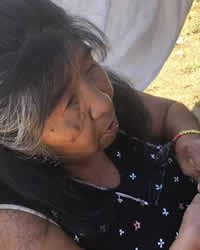The Mono are a First Nation people of central Sierra Nevada, the Eastern Sierra, the Mono Basin, and the Great Basin. Most currently dwell in North Fork, California. The Mono have historically been broken into two regional groups: Eastern and Western Mono. The Western Mono are known as “Nimi,” meaning “the people,” in their native language. The Eastern Mono call themselves the “Numa,” also meaning “the people.” Historically, the Eastern Mono settled along rivers or springs, which provided fertile ground for agriculture. Because of these resources, the Eastern Mono were capable of sustaining larger groups. These groups lived in districts, with each district being ruled by a headman. The Western Mono, on the other hand, were largely semi-nomadic hunter-gatherers. As a whole, the Mono tribes sustained higher survival rates than other Native Americans in the 19th century. This has been attributed to the Mono's relative removal from settler interaction.
As one of many “homeless Indians,” the Mono were given three rancherias by the American government. While several cultural traditions were preserved here, many of this group eventually moved to larger cities. The Mono traditional narratives continue to preserve their oral history.
Some Mono still practice traditional trade, basket making, beadwork, fishing, hunting, acorn gathering, cooking, healing and games. Today, individual communities are governed by a tribal council. While the traditional Mono language is declining, some still speak this language. Reservations and other communities include the Tule River Reservation, the Posgisa community, the Num, the Wobonuch community, and the Holkoma community. Several of these, such as the Big Sandy community, put on regular programs to preserve the Mono's cultural identity.
The American government's termination of federally supported rancherias caused a negative economic impact on the Mono community. The Big Sandy Rancheria in California is one example. Issues such as substance abuse, poor education and employment rates, and low income are still affecting the Mono to this day.
The Mono's ethnic religions come from a fear-power culture. Traditional spiritual beliefs find their foundation in a need for protection against more powerful forces. Because of this, those who still hold to ethnic religions believe supernatural powers can be given from the spirits to a person. In the past, this could be accomplished through a variety of rituals, including the consumption of datura, a drug. A connection with nature is highly valued as a means by which to receive spiritual power. A shaman, or person with influence in the supernatural world, is believed to be particularly skilled in such rituals. The Mono also practice several ceremonies, such as bear dances, the annual mourning ceremony, and the Ghost Dance. Because the active practice of traditional Mono culture is declining, Christianity is now the majority religion.
The Mono need to put Christ first in their lives through active discipleship. Additionally, many suffer economic hardship.
Praise God for providing Bible translations for the Mono.
Pray for the Holy Spirit to revive the Mono church, leading them to make disciples.
Ask God for fellowships that are Christ centered, rather than tradition centered.
Pray for a spiritual hunger and discernment that will protect them from spiritual counterfeits.
Scripture Prayers for the Mono, Monache in United States.
https://what-when-how.com/native-americans/mono-native-americans-of-california/
https://en.wikipedia.org/wiki/Mono_people
| Profile Source: Joshua Project |










